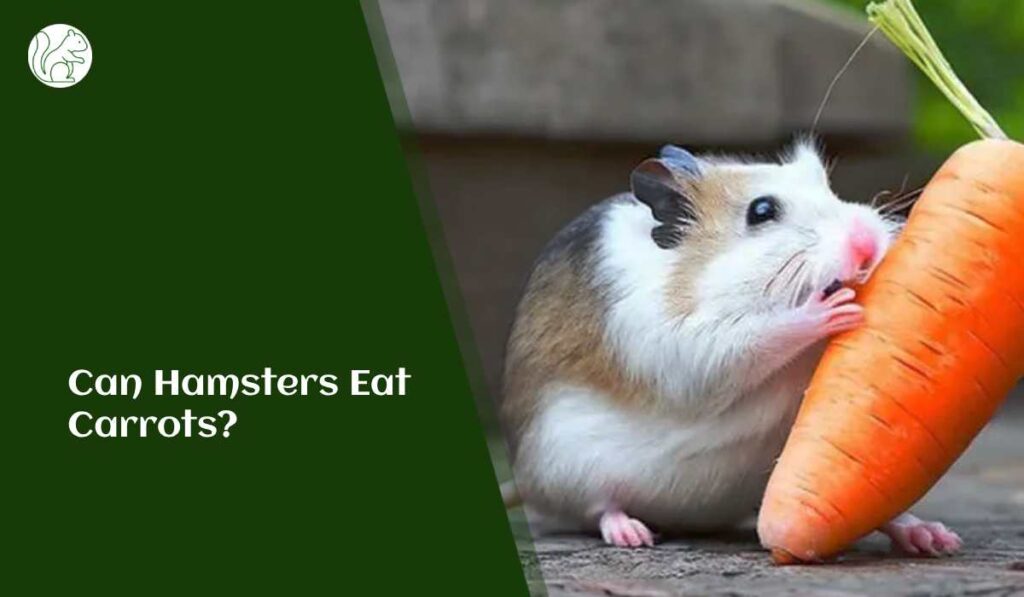Carrots are a popular vegetable known for their crunchy texture and sweet taste. As a hamster owner, you might wonder if carrots are a suitable addition to your furry friend’s diet. So, can hamsters eat carrots? Let’s explore this question and provide you with the necessary information to make an informed decision about including carrots in your hamster’s diet.

Nutritional Value of Carrots
Carrots are a nutritious vegetable packed with essential vitamins and minerals. They are an excellent source of vitamin A, vitamin K, and dietary fiber. Carrots also contain antioxidants, which help support your hamster’s overall health and well-being.
Feeding Carrots to Hamsters
When it comes to feeding carrots to hamsters, here are some important points to consider:
1. Portion Size
Carrots should be offered to hamsters in moderation. Due to their high sugar content, it’s important to limit the portion size. A small piece of carrot, approximately the size of your hamster’s paw, is sufficient as a treat.
2. Freshness and Quality
Choose fresh, firm carrots for your hamster. Avoid using carrots that are soft, wilted, or have moldy spots. It’s best to wash the carrots thoroughly to remove any dirt or pesticides before offering them to your pet.
3. Preparation
Before feeding carrots to your hamster, ensure they are cut into small, manageable pieces. This makes it easier for your hamster to chew and prevents any potential choking hazards. Remove the carrot tops and any greens, as they are not suitable for hamsters.
4. Introducing New Foods
When introducing carrots or any new food to your hamster’s diet, do so gradually. Observe your hamster for any signs of allergies, digestive issues, or changes in behavior. If you notice any adverse reactions, discontinue feeding carrots and consult a veterinarian.
5. Variety and Balance
While carrots can be a healthy addition to your hamster’s diet, it’s important to provide a well-balanced and varied selection of foods. Carrots should complement a foundation of high-quality hamster pellets, fresh vegetables, and other suitable treats. Offering a diverse range of foods ensures that your hamster receives a complete and balanced diet.
Alternatives to Carrots for Hamsters
If you’re looking to provide alternative vegetables or treats to your hamster, consider the following options:
- Broccoli: This cruciferous vegetable is safe for hamsters in small quantities. Steam or blanch the broccoli before offering it to your pet.
- Cucumbers: Sliced cucumbers can be a refreshing and hydrating treat for hamsters. Just ensure they are seedless and cut into appropriate sizes.
- Leafy Greens: Spinach, kale, and lettuce leaves (such as romaine or green leaf lettuce) can be provided to hamsters occasionally. Wash them thoroughly and offer them in moderation.
Remember that treats, including vegetables, should only make up a small portion of your hamster’s diet. The main focus should be on providing a balanced diet with high-quality pellets, fresh vegetables, and ample water.
Conclusion
In conclusion, carrots can be a healthy and enjoyable addition to a hamster’s diet. These crunchy vegetables are packed with essential vitamins and minerals that can contribute to your hamster’s overall well-being. However, it is important to introduce carrots gradually, in small portions, to prevent digestive issues.
Remember to wash the carrots thoroughly and remove any pesticide residue before offering them to your hamster. As with any food, moderation is key, and it’s essential to provide a varied diet that includes other fruits, vegetables, and high-quality hamster food. If you have any concerns about your hamster’s diet or health, it is always best to consult with a veterinarian for personalized advice. With proper care and attention to their nutritional needs, your hamster can enjoy the occasional carrot treat while maintaining a balanced and healthy diet.
